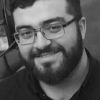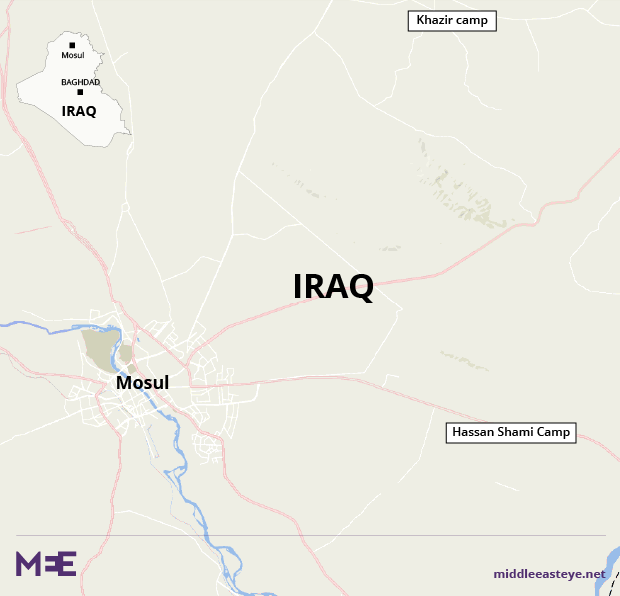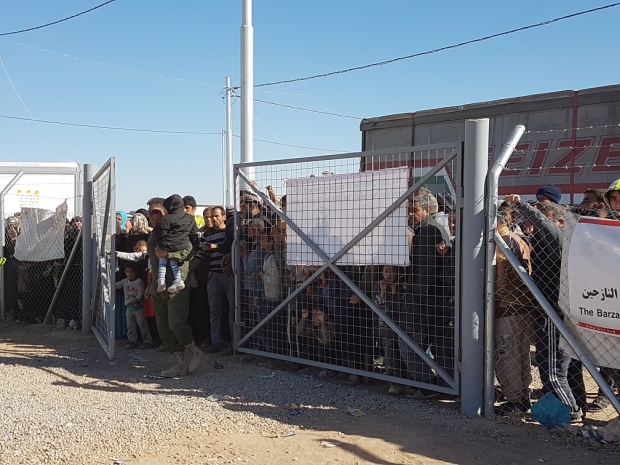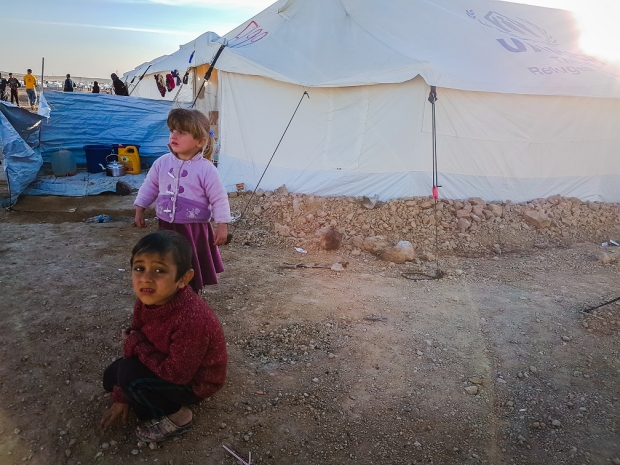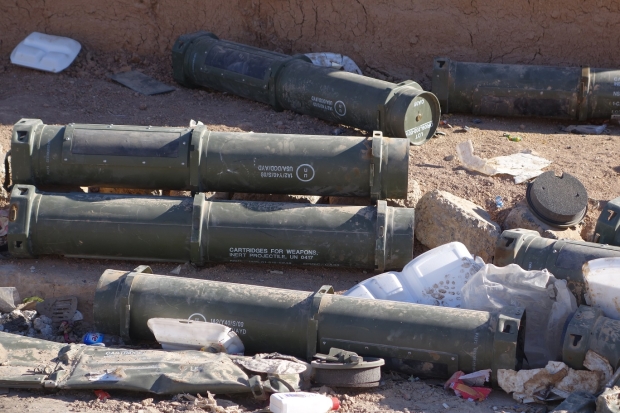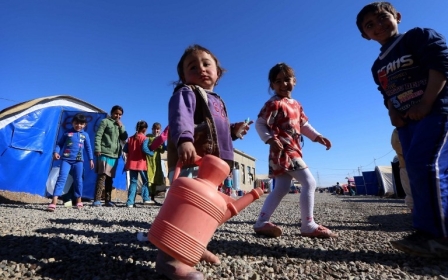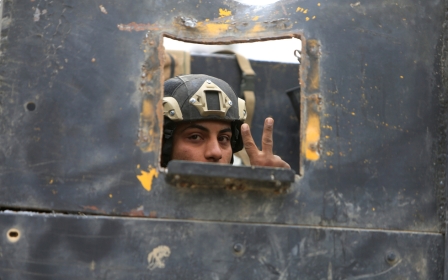What I saw in Mosul: 'Here, there is no hope, no water, no food'
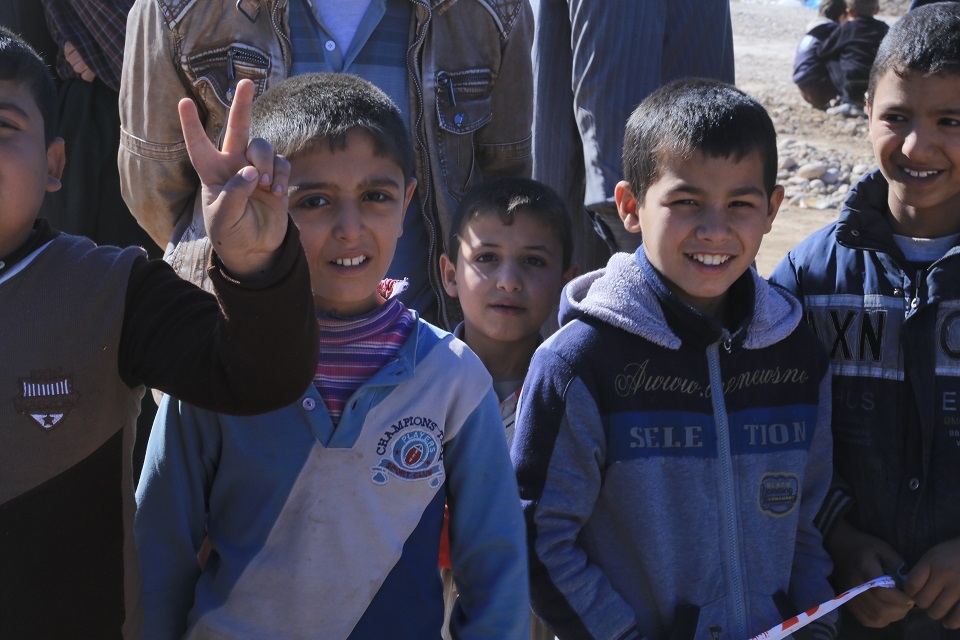
Driving through Mosul was like passing through scenes from a post-apocalyptic Hollywood movie.
Everywhere I could see, there was evidence of the ongoing battle. Spent bullet and rocket casings littered the ground, as did the shells of vehicles which had been used as car bombs.
Driving through Mosul was like passing through scenes from a post-apocalyptic Hollywood movie
Almost all the buildings which lined the streets had been destroyed or charred by fire and there was no one in sight, except for the odd ambulance or military hummer racing at high speed.
Suddenly, as we got closer to newly liberated areas, people started to emerge from their homes and chase our convoy full of flour, water and basic food items.
Children ran towards us smiling and cheering, holding up their fingers into the peace sign, hoping that by doing so, they would receive something. Looking closer you could see the fear and apprehension on their faces. Having survived two years of life under the Islamic State (IS), they did not know what to expect from their new visitors.
Trapped inside
To date, the Iraqi forces, backed by Western allies, have just about managed to clear the outskirts of the eastern side of the city from IS fighters. Although progress is slow, it is steady.
However, far from the military gains and losses, the humanitarian situation is dire, and getting worse day by day. The two million civilians trapped inside the city including family and close friends are subject to horrid living conditions.
They have limited access to basic necessities such as food and electricity and with winter approaching, sources of warmth. Recent reports estimate that half a million people have no access to clean running water.
Outside of the city, the UN estimates that around 75,000 residents have fled, a figure that rises daily as people continue to stream into the refugee camps just on Mosul’s outskirts.
A generation robbed
Our original plan was to deliver aid to internally displaced people in the refugee camps in the north of Iraq.
Local officials, UN representatives and other NGOs, explained to us that newly liberated areas of the city had yet to receive any aid what so ever. Therefore, their need was greater and it was decided that we would enter the areas and distribute what we could.
New arrivals faced the prospect of winter trapped inside a tent in the middle of the Iraqi desert where temperatures could often plummet well below freezing
Yet first, we took a trip to both the Khazir and Hassan Shami refugee camps which at the time was home to approximately 35,000 and 15,000 people respectively, who fled Mosul and various other cities within Iraq.
As soon as I arrived to Khazir, I saw throngs of people pressed up against fences, staring at parked trucks carrying bottles of water and stacks of food, hoping to receive some extra aid.
In the few hours that we spent there, we were completely covered in sand and dirt that took a while to wash off. At both camps, we spent most of our time handing out blankets to new arrivals who all faced the prospect of winter trapped inside a tent in the middle of the Iraqi desert, where temperatures could often plummet well below freezing.
A whole generation have been robbed of their childhood and innocence
A woman who was a school head teacher back in Mosul and now lived at the Hassan Shami camp, shared how she fled with her family in the middle of the night leaving all their belongings behind.
She spoke of the once proud life that she and her family once lived, in a home that was built on the back of her and her husband’s hard work. This was all abandoned, she told me, along with the jewellery, cash and savings they had amassed throughout the years.
Without food or a stove, she said that they had to go to other tents in the camp to cook and eat in, then bring back any surplus food they had left.
In the midst of all this, the thing that is sure to remain in my mind for years to come, was the sight of children keeping themselves entertained as they ran around the tents with pieces of string or simply a stick or a rock, completely oblivious to their surroundings.
However, taking a longer look, I realised that a whole generation have been robbed of their childhood and innocence.
Anyone attempting to approach or speak to her caused her to scream and cry. I stood speechless, wondering what she must have witnessed to react like this.
Delivering aid
Our second trip was to the newly liberated areas of Mosul, specifically to the Zahraa district, which up until five days before our arrival was under the control of IS militants.
When we reached our final destination, we drove through completely deserted neighbourhoods whilst being chased by hundreds of people, some of which had run for kilometers. A few thousand people had gathered around the truck with people lined up as far as the eye could see, to get help which made distribution nearly impossible.
After having spent two years under IS rule they now faced a harsh winter without any basic necessities
I myself was caught up between the masses, and found myself being crushed against the body of the car as people ran forward, hoping they would receive something.
Things eventually calmed down and I had the opportunity to speak to a couple of civilians.
One gentleman was complaining of a recent missile strike on the main water pipe that feeds the area. It had shattered the pipe and rendered it useless, cutting off the water supply.
It was evident by the looks on people’s faces and the way they ran at our convoy that they were struggling. After having spent two years under IS rule, they now faced a harsh winter without any basic necessities.
Holding onto hope
On our way out of the city, there were several families carrying their belongings and walking. We stopped to talk and learned that they were headed to refugee camps a good 50km away.
Can you imagine what life must be like to force someone to walk that distance to live in a tent?
I will be praying for the children, the widows, mothers, fathers and my family that are facing this calamity alone
“Here, there is no hope, no water, no food and no electricity and we don’t know whether will live or die,” one mother told us. “At least in the camps, we have a roof over our head, clean water and meals daily.”
Although the military operation barely scratched the surface and the situation is getting worse day by day, I came across a few people who were hopeful and optimistic. One man said: “Al-Hamdulilah ('Praise be to Allah') I have a roof over my head and my family are still alive.”
It is this hope and trust that the people of Mosul have that has kept them sane. One can only pray for the many people trapped inside.
I know that I, for one, will be praying for the children, for the widows, mothers, fathers and my family that are facing this calamity alone.
-Mustafa Al-Dabbagh is a British-Iraqi independent writer with a special interest in Iraq and the Middle East.
The views expressed in this article belong to the author and do not necessarily reflect the editorial policy of Middle East Eye.
Photo: Children at the Khazir refugee camp near Erbil, Iraq
This article is available in French on Middle East Eye French edition.
New MEE newsletter: Jerusalem Dispatch
Sign up to get the latest insights and analysis on Israel-Palestine, alongside Turkey Unpacked and other MEE newsletters
Middle East Eye delivers independent and unrivalled coverage and analysis of the Middle East, North Africa and beyond. To learn more about republishing this content and the associated fees, please fill out this form. More about MEE can be found here.


